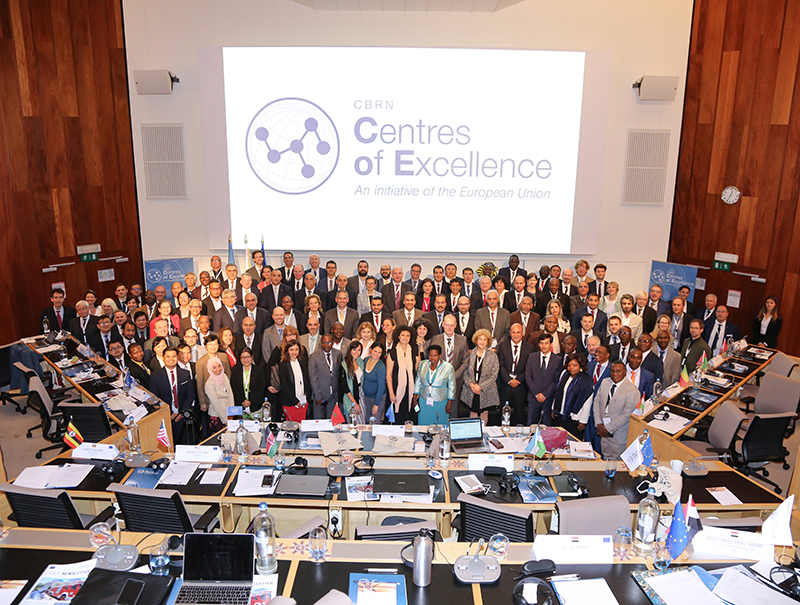
European Commission - Press release
La Hulpe, 17 June 2019
A turning point has been reached in the fight against Chemical, Biological, Radiological and Nuclear (CBRN) risks and threats worldwide. This was highlighted during the Annual meeting of the European Union CBRN Risk Mitigation Centres of Excellence (EU CBRN CoE) that took place from 12 to 14 June in La Hulpe (Belgium).
The international three-day meeting gathered 200 participants from over 60 countries involved in the EU CBRN Centre of Excellence (EU CBRN CoE ) - an EU initiative created in 2010 with the aim of fostering national, regional and interregional cooperation around the world to better prevent chemical, biological, radiological and nuclear incidents or disasters.
In her opening speech, Mrs Henriette GEIGER, Director, People and Peace, European Commission’s Directorate-General for International Cooperation and Development (DG DEVCO) said: “We are facing challenges today that go beyond national borders and cannot be tackled alone. This is true for cooperation on CBRN matters, as witnessed by recent CBRN attacks and events in Europe, its neighbouring countries and use of chemical weapons in Syria, but also by the re-emergence of epidemic diseases like Ebola in Africa, or by the increased devastating effects of natural disasters and climate disorders.”
Mrs Bettina TUCCI BARTSIOTAS, Director, United Nations Interregional Crime and Justice Research Institute (UNICRI) told the audience that the CoE Initiative, with 62 countries working together, “is a telling example of a collective action for the common good.”
Organised by the European Commission’s Directorate General for International Cooperation and Development (DG DEVCO) and UNICRI, the meeting was the occasion for fruitful discussions among the participants from Africa, Asia, the Middle-East, South-East and Eastern Europe, as well as observers from Kazakhstan, the USA, and regional and international organisations. During plenary sessions and thematic and regional round tables they reviewed progress in each region and defined future priorities.
The Heads of Secretariats from the 8 CoE regions reported impressive progress, including:
• Increasing examples of South-to-South cooperation like in the North-Africa and Sahel region, in Central Asia, and in the Gulf region with Kuweit proposal to channel part of a 6 bio EUR fund to massively support Iraq;
• Emergence of regional CBRN Schools of Excellence and CBRN training modules in South East and Eastern Europe, in the Middle East and in several African regions;
• Finalisation of National Action Plans by Rwanda, Afghanistan, Vietnam and Uzbekistan;
• A first CoE project in the Gulf region, which was launched during the meeting;
• Many field exercises took place and new exercises will be organised in the next two years.
At the end of the meeting, the EU CBRN CoE Prize Awards took place, rewarding best regional success stories and innovative and creative proposals.
In his conclusion, Mr Olivier LUYCKX, Head of Unit, Security, Nuclear safety (DG DEVCO) underlined that this meeting was a breakthrough for the CoE initiative. He highlighted the “spirit of trust and confidence” between the participants, saying that this was unpreceded. Giving an outlook into the future, Mr Luyckx said that emerging technologies with a potential CBRN dimension, like artificial intelligence, the use of drones, or cyber applications have to be taken more and more into account and that the subjects of cybersecurity related to CBRN will be part of working perspectives for the years to come.
Mr Pawel Herczynski, Security and Defence Policy Director (European External Action Service) thanked the audience in the name of the EU High Representative Federica Mogherini for “their efforts, the very rich and inspiring discussions” and their enthusiasm which he called essential for this initiative. He said that he was truly impressed by the progress made, and that the EEAS will continue to work to increase the visibility of the CBRN CoE initiative.
Background information:
The EU CBRN Centres of Excellence initiative was set up in 2011 to increase national and regional CBRN actions plans, foster local expertise and ensure long-term sustainability through a dynamic network. This initiative goes in line with the European Commission’s policy objectives in international cooperation and development, following the principle that security and development go hand in hand.
The European Commission's Directorate General for International Cooperation and Development (DG DEVCO) is responsible for designing European international cooperation and development policy and delivering aid throughout the world in order to reduce poverty, to ensure sustainable economic, social and environmental development and to promote democracy, the rule of law, good governance and the respect of human rights.
For more information: https://ec.europa.eu/international-partnerships/
UNICRI’s mission is to advance justice and the rule of law in support of peace and sustainable development. With more than 50 years of experience, the Institute develops and implements improved policies in the field of crime prevention and justice. UNICRI works in specialized niches and selected fields of crime prevention, justice, security governance, and risks and benefits of advances in technologies. UNICRI provides a vital foundation for UN policy and operations through its cutting-edge specialised training and capacity-building programmes.
For more information: www.unicri.it
Details
- Publication date
- 17 June 2019
- Author
- Joint Research Centre
- Location
- Brussels
